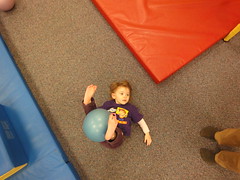Tuesday, April 26th 2011
#scimom and me
 I’ve been thinking on this #scimom meme for some time. To be honest, I’ve had a hard time figuring out what I could write that would be a useful or thoughtful contribution, despite the fact that I tend to be pretty comfortable mixing personal stories in with the science I write about on this blog. Heck, I’ve even shared my birth experience for all to read!
I’ve been thinking on this #scimom meme for some time. To be honest, I’ve had a hard time figuring out what I could write that would be a useful or thoughtful contribution, despite the fact that I tend to be pretty comfortable mixing personal stories in with the science I write about on this blog. Heck, I’ve even shared my birth experience for all to read!
But writing directly on the intersection of science and mothering? That is somehow a much more frightening prospect, even though I am in a friendly discipline. It is hard to face the reality that my colleagues respect my reproductive decisions, in the historical context where that has not always been the case in academia, and in the personal context where my decisions are judged and challenged by others all the time, even if they aren’t colleagues: first because I am a woman, then because I was pregnant, and now because I am a mother.
So, I want to tell you two things: how I make my life work, and why I do it at all.
Putting in the time
I get asked a lot how I balance my life, how I get any sleep, how I have a tenure track job and a blog and am an amateur athlete and mother all at the same time. The answer is that balance is not attainable, but that I’m really happy exactly as things are.
The supermagical key to being a mother and an academic scientist is: you need to devote a lot of time to both. As romantic and wonderful as it sounds to try to do both at the same time, it almost never works. When young women ask me how I do it all, I answer that the two keys for success are social support and full time childcare. For me, that means a supportive partner and forty-five hours a week of childcare outside of my home.
Usually, the woman asking pauses. I can see the barely masked horror on her face as she realizes that I don’t have a happy existence where I do puzzles with my daughter with one hand while tapping at my laptop with the other. I look like a nice enough person, so she rejects what I’ve told her — that my child is out of my sight most of the work week — and tries again. “Okay, but really, how do you do it?” And I reply that I need social support and full time childcare. This is how I address the can’t-be-in-two-places-at-once problem. Some hours I do the puzzles, other hours I do the writing. I almost never mix the two.
At the beginning of each semester, my husband and I sit down with our schedules: our regular faculty meeting times, lab meetings, office hours, teaching hours, and how much time we want to exercise. We also look at our daughter’s schedule, since she has swimming twice a week. Then we slowly work out an equitable arrangement of pickups and drop-offs that we stick to, with the closest thing we can approximate to religious fervor, for the whole semester. I no longer go out for social coffees or lunches and stay at my desk the entire day (though at least I am standing). When our daughter goes to sleep, I often work for a few hours, though I certainly don’t do this every night unless I have a major deadline approaching. This is the reality of my job if I want to be a mom and academic.
Can you be a scientist and mom if you don’t have social support and full time childcare? Yes, though I would contend you need at least one of the two. And here’s why: I need a supportive partner because, when the mommy guilt kicks in, he is the one who encourages me to go to the extra team practice, or stay the extra hour at work I need to hit my deadline. He is the one who reminds me that he wants a close relationship with our daughter, too, so bugger off and let him cuddle her for once. You don’t need a partner to do these things for you, but you do probably need someone to hold the right perspective for you in those moments you feel crazy.
And I need the full time childcare because this whole idea that you can get all your work done during naps, or every night once your kid goes down, is a fantasy we need to stop entertaining. Just because our job is flexible doesn’t mean it can fit into fewer hours unless you, like Hermione Granger, got special permission to use a Time-Turner. And while this job doesn’t necessarily require a sixty hour workweek, it does require at least forty. So if you don’t have at least forty kid-free hours a week you will not make adequate progress.
Why I do this
I enjoy my job. I even love it. But I love it because I made it a job that I wanted. In its worst moments I am still filling out too much paperwork, dealing with too much bureaucracy, or student cheating, or people who do not appreciate the contributions one makes to the discipline by, say, blogging or teaching.
But this job’s best moments far outweigh the worst, and if I didn’t feel that way, I would find something else to do. So far, in this job I have gotten to pursue the research agenda I find the most interesting, which has had me pursuing new methodologies, new areas of study, and new ways of thinking about female physiology and health in a way I find exciting on a daily basis. I have been able to effectively mentor about a dozen undergrads and several grad students. I have created learning environments that make me proud to teach in a university setting. And I have been able to put on my ranty pants when it comes to evolutionary psychology.
I am going to tell you a secret. I do this job, I am this kind of person, because I want to be a role model for other young women, that they can have jobs and have kids and still have other things going on in their lives.
But really, most of all, I do this for my own daughter, far more than for any of you reading today.
I do this so that when my daughter plays house with her friends, she introduces the idea that the Daddy does the dishes, or puts the baby to sleep. Already my daughter likes to play gym or office as well as house. That’s not to delegitimize parenting and domestic work, but to simply place it alongside the other activities people do. None of these activities should be particularly privileged above each other as being more feminine, OR more important.
 I do this so that she has a role model when her first teacher says girls just aren’t as good at math. I want her to remember that Mommy and Daddy do science every day, and that that science requires a lot of math.
I do this so that she has a role model when her first teacher says girls just aren’t as good at math. I want her to remember that Mommy and Daddy do science every day, and that that science requires a lot of math.
Finally, I do this so that she has a role model to hold on to when her first classmate says that only boys are good at sports. I want her to remember that Mommy is the one with the big muscles in that moment, not only so that she can have big muscles one day but so that she knows I can kick that kid’s ass.
Being a #scimom
This #scimom meme is compelling for all sorts of reasons. I hope it will make scientist mothers less invisible, and de-scrutinize women’s decisions, whatever they may be. I’ve said before that there are ways in which women are conditioned to be risk-averse over the course of their lives, and a lot of this has to do with the scrutiny, the drama, the push and pull of differing expectations on our time, our lives, and our bodies.
There are external factors that need to be fixed like maternal leave, and people that need gentle reminders about their implicit biases. And there are changes that women need to make within, where they work to operate against their internalized sexism. These battles feel especially public, and make me at least feel especially vulnerable, as a working mother. That’s why this is all so hard to talk about.
Women are incredibly powerful, we just don’t act like it often enough. Perhaps the #scimom meme will contradict the risk aversion and provide us with the courage to gang up on the problems of the world. This story on Michelle Bachelet has been on my mind ever since I read it last week. Read about Bachelet, and think on her life and what she is trying to accomplish right now. She knows it takes women to create a revolution. Let’s move things along.
